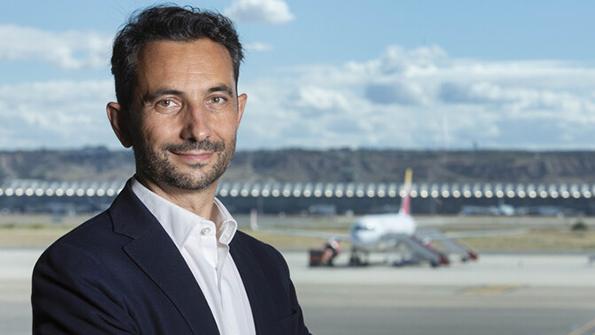
Enrique Robledo was appointed chief technology officer of Iberia Maintenance in February.
Enrique Robledo, appointed chief technical officer of Iberia Maintenance in February, discusses with James Pozzi the MRO’s push for more third-party maintenance work and how it plans to manage its first Pratt & Whitney geared turbofan engine induction this year.
Where has Iberia Maintenance seen strong maintenance demand this year in comparison to the previous two years? The demand is growing because the airlines are flying more than in previous years. We’ve seen some carriers have either the same or even bigger capacity than they used to have in 2019. Demand has been strong in nearly all areas but especially on the aircraft side with more aircraft being returned to service following extended periods of being grounded. As a result of this, we’ve seen growth in the heavy maintenance sector. This has led to many new problems being identified, as it is common to find issues on aircraft that have been grounded as opposed to ones that have been in regular service. Also, engine maintenance is growing as their hours on-wing start to increase.
What is the split of MRO work between third-party services and work related to International Airlines Group carriers Iberia, British Airways, Aer Lingus and Vueling? The percentage split has grown somewhat over the past year toward third-party maintenance in our engine shop. Right now, 73% of our engine MRO work is third-party with the remaining 27% International Airlines Group (IAG) customers. This has been driven toward third-party work mostly through engine MRO because for airframe heavy maintenance, we are still heavily concentrated on IAG carriers because we have the capacity, and with demand so high right now we are very busy servicing those airlines. In engines, we want to grow further and are hiring people and making more slots available. This extra capacity can be filled by third-party work. With new engine types such as the geared turbofan (GTF) and CFM International Leap growing in the fleet, we expect this to reach 80% third-party work. This split would reflect the current percentage split Iberia has in engine services. This would be started by the GTF because we are in the final stages of capacitation for this engine. We’ve recently finished the correlation of the test cell, so we now have the tooling and the training in place and are expecting the first engine in October or November. There is a high demand for this type of engine, and we are receiving calls to commence work as soon as possible.
How do you plan to manage capacity for the GTF family to begin with? It’s going to feed the capacity we will have booked for the GTF. It is a new engine, and we are building a separate workflow for it. We have designated capacity isolated for it, so the capacity of the GTF won’t influence the rest of the shop. After beginning as a fixed capacity, we will eventually grow it year by year or maybe every six months. As it is a new engine, it makes sense to do it this way and will ensure slots are freed up for the rest of the non-GTF engine fleet.
Where do you identify a lack of capacity in the MRO market? There is a lack of capacity in heavy maintenance. Our customers tell us how difficult it is for them to find reliable slots at heavy maintenance. When we are at full capacity and they have to subcontract something out, then they suffer. A lack of capacity in this area could be a trend for the next 3-4 years. On the engine side, it is quite similar but more dependent on maintenance peaks. Now after the summer months, there will be another peak of engines, and some of those engines will have to wait a bit longer to be inducted. In other parts of the year, it will be the opposite, when a large volume of engines are flying. In the future, a lot will depend on what happens to the new engine types and whether they’ll need a lot of shop visits earlier than expected. More mature engines are still flying, as airlines are extending these. We are preparing for the capacity scenario by growing our facilities, MRO capabilities and skilled people. This year, we’ve hired more than 150 mechanics just to work in our engine shop. Most of those people were trained by our in-house technical training school.
Have turnaround times and the Iberia Maintenance supply chain settled in 2023 compared with last year? The global supply chain has been very challenged. Across a network of suppliers, just a small number of them not performing can challenge the whole thing. It’s been slightly better this year compared with 2022, but it still isn’t where it should be. This is very much impacting turnaround times. OEMs and our other suppliers tell us they expect the supply chain network to stabilize in the next 12-18 months.





